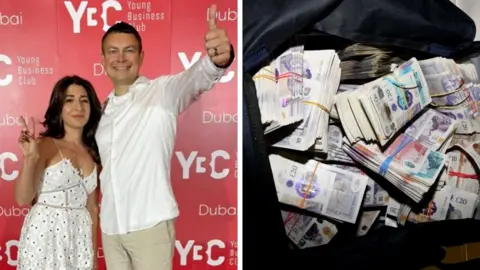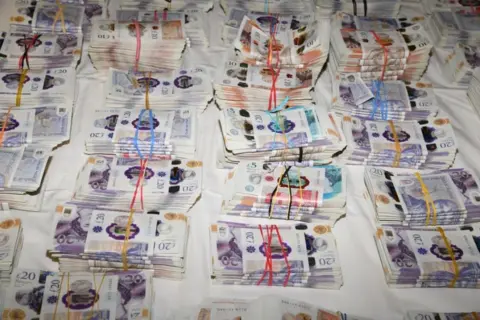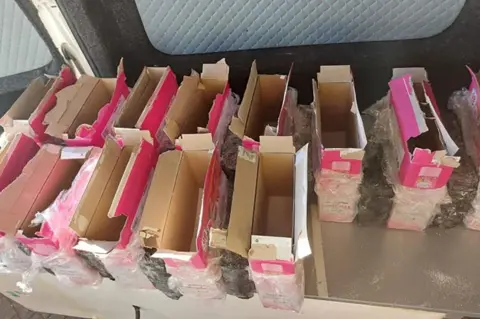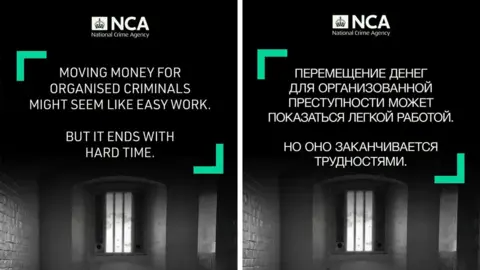Friday-night drug deals helping Russian war machine, UK crime agency warns
1 hour agoDaniel SandfordUK correspondent

 National Crime Agency
National Crime AgencyBuying cocaine on a Friday night in Britain can indirectly help Russian arms factories, the National Crime Agency (NCA) has warned.
The NCA said a man linked to a Russian-led money-laundering network operating in the UK had bought a bank in Kyrgyzstan which was used to make payments on behalf of the Russian war machine.
Sal Melki, the agency’s Deputy Director for Economic Crime, said it was a “vast criminal ecosystem that is funding some really bad things all around the world”.
The NCA is trying to disrupt the network from top to bottom, even putting adverts in UK motorway service station toilets to warn couriers carrying cash for the money-launderers of the lengthy jail sentences they face.
The investigation into Russian money laundering is called Operation Destabilise.
Last year the NCA said it had identified two networks called TGR and Smart that worked together to process cash for drugs gangs, suppliers of illegal firearms and people smugglers.
Investigators have now discovered that George Rossi, who heads up TGR, bought a bank in Kyrgyzstan.

 National Crime Agency
National Crime AgencyRossi bought the bank through his company Altair Holding SA. On Christmas Day 2024, Altair Holding SA took a 75% stake in Keremet Bank.
Further work showed that Keremet Bank was facilitating payments for a Russian state-owned bank called Promsvyazbank (PSB) which is described by the US treasury as a “sanctions evasion hub”.
The NCA says Keremet Bank was helping PSB make payments for “Russia’s military-industrial base”, in other words, for the arms factories making weapons for the Ukraine war.
At street level TGR and Smart provide a “full spectrum of money-laundering services”, the NCA said.
They allow people like drug dealers and suppliers of illegal firearms to swap their cash for cryptocurrency.
Investigators say the money-laundering network was operating in at least 28 towns and cities across the UK “sustaining an entire architecture that allows crime to pay in our country”.
The NCA’s Sal Melki said: “We can’t ignore the sheer scale of this threat.”
He said: “We can draw a thread between somebody buying cocaine on a Friday night in the UK, all the way through to geopolitical events that are causing suffering across the world.
“It’s not as simple as ‘OK, I pay my drug dealer and that is the end of it’. This is actually a vast criminal ecosystem, that is funding some really bad things all around the world.
“We can say with certainty that laundering street cash is really critical to underpinning how serious crime works in our country.”

 National Crime Agency
National Crime AgencyHe also said that his investigators had discovered that the Smart network run by Ekaterina Zhdanova had provided financial services to the ring of spies led by Bulgarian Orlin Roussev, who tracked Russia’s enemies across Europe. Zhdanova is currently in custody in France awaiting trial.
Operation Destabilise began by tracking the activity of the ransomware group Evil Corp, but ended up uncovering “eye-watering scales” of money-laundering, the NCA said. Smart and TGR were trading “billions of pounds of criminal wealth”.
The money they collected was laundered through cash-rich businesses such as construction, or bundled up in “stash houses” and taken out of the country to be laundered overseas.
Sometimes the cash was smuggled out hidden in boxes of washing powder and baby formula.

 National Crime Agency
National Crime AgencyAmong those linked to the groups are former Hibernian footballer James Keatings, and Semen Kuksov and Andrii Dzektsa, who the NCA say laundered money for the Irish Kinahan drugs cartel.
Two men convicted this year, Valeriy Popovych and Vitaliy Lutsak, were buying vehicles in the UK and driving them to Ukraine where they
‘Walls closing in’
At the bottom rung of the ladders, the money-launderers need couriers to move criminal cash around the country.
The couriers typically earn a commission of 0.5%. So moving £100,000 earns them £500. But they can get prison sentences of five years or more.
“You own all the risk,” Mr Melki warned them.

 National Crime Agency
National Crime AgencyAdverts have been placed above urinals in motorway service stations in Russian and English warning that “moving money for organised criminal might seem like easy work. But it ends with hard time”.
The NCA’s Mr Melki said: “We’re communicating with them directly in their own language to say: the walls are closing in.
“We know who you are, and we’re coming for you.”
If you, or someone you know, have been affected by addiction, support is available via BBC Action Line